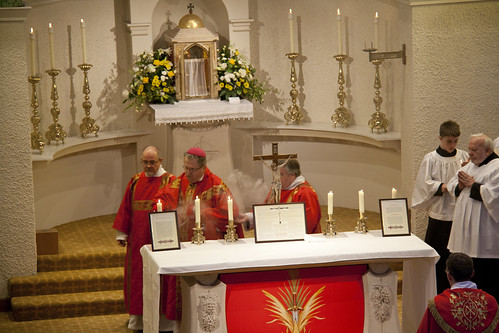 |
| Oppression! Oppression! |
It seems he has the highest regard for the role of rubrical nit-pickery as a form of liturgical catechesis. He is oddly obsessed by the importance of the 'Communion song', but he is interested in other matters too.
'But on some occasions it is a relief to be able to speak from the conviction of specialised knowledge. This is one of those occasions, and it allows me to say that as far as canon law is concerned we are still being oppressed by non-essentials, which ignore Paul's decision not to burden the Church with them (Acts 15:28). Our interior growth in holiness may not be positively impeded, but it very often isn't helped either.
'...The energy, and indeed the money, recently expended in the imposition on the English-speaking world, an unwanted and unwelcome, artificial and stilted, unprofessional and occasionally theologically inaccurate translation of the Mass, which did not even originate from the "competent territorial authorities" entrusted with liturgical translation by Vatican II (SC, n.36.4), must have been at the expense of more fruitful ways of achieving the goal of "full, conscious and active participation in liturgical celebrations which is demanded by the very nature of the liturgy" (Sacrosanctum Concilium, n14).
In short, the way the Ordinary Form is celebrated is commonly lousy (or nit-infested) with liturgical abuses that "contribute to the obscuring of the Catholic faith and doctrine concerning this wonderful sacrament". Those are the words of the Instruction Redemptionis Sacramentum; more of that later.
The worthy man goes on to rail some more about the new translation: faced with its phrases 'priest and people lose the will to live, let alone try to understand Church teaching about the hand as a throne for Christ at Communion, the fuller symbolism of Communion from the chalice, of the need to sing during the Communion procession. In consequence a liturgical catechesis, which is not only desirable but mandatory, is not taking place.'
Well let me let some light into the darkness Mgr Loftus has generated here. To go into all the issues of liturgical law he raises would be tedious indeed, but briefly on three narrow points: the use of 'hieratic' language in the new translation of the 1970 Missal, the 'secondary altar', and the reception of Communion under Both Kinds.
The 'secondary altar' business is complicated, but many churches either do, or ought, according to the rules, use an altar with the tabernacle fixed to it, a practice Loftus clearly abhors. Here's the Congregation for Divine Worship:
See the FIUV paper on celebration ad orientem.
Episcopal conferences and ordinaries also are not to go beyond what is laid down in the
present discipline: the granting of permission for Communion under both kinds is not to be
indiscriminate, and the celebrations in question are to be specified precisely; the groups
that use this faculty are to be clearly defined, well disciplined, and homogeneous.
Some time after this the Vatican gave up trying to stop bishops from permitting it as widely as they liked, but the document's point is still valid. Offering the Chalice routinely to large numbers of people is asking for trouble, practically (given how it is distributed in the Latin Church) and theologically (obscuring the reality that Our Lord is present entire in the Host), and was never the intention of the Council Fathers.
Inaestimabile Donum in 1980, Redemptionis Sacramentum in 2004, and a number of documents in between represent the concerted, but ultimately unsuccessful, attempt to reign in liturgical abuses in the Ordinary Form, under Bl Pope John Paul II. They failed because there was no system of enforcement, and if things are better now it is not because of fear of sanctions from these rules, but because a new generation of priests, and in some cases bishops, want to be stricter about the rules even if it makes them unpopular, even if people like Mgr Loftus attack them for it.
Loftus is suggesting that the failure to persecute priests who don't conform to his favourite liturgical fads is oppressive. He proudly points out that some of these fads are permitted, and is sad that they are not widespread. Last week he violently attacked priests who keep other rules, which he think are themselves oppressive. All in all, he is very dissatisfied with the way the Ordinary Form is celebrated, not just because of failures to keep the rules but because of the rules themselves, a position which seems to be widely shared right across the spectrum of opinion in the Church.
Take some advice from me, Mgr Loftus. If you want to criticise the Ordinary Form, do so in moderation, and without impugning the good will of those who disagree with you, or who take advantage of liturgical options are not to your taste. Otherwise, you end up embittering the debate and entrenching positions.

Just when you think the Monsignor could not possibly embarrass himself any more than he has hitherto...
ReplyDeletehttp://youtu.be/_SFlsMsWkbw
"And every week people in many parishes are deprived of fuller participation because, in total contravention of an explicit General Instruction in the Roman Missal, their view is impeded by a crucifix and six candlesticks..."
ReplyDeleteThere's an incredibly easy solution to this difficulty: Celebrate Mass ad orientem. (It's even permitted in the GIRM!)
At that point, there won't be anything at all between the congregation and the priest - not even the altar.
Was Basil receiving on the tongue in his last photo above?
ReplyDelete